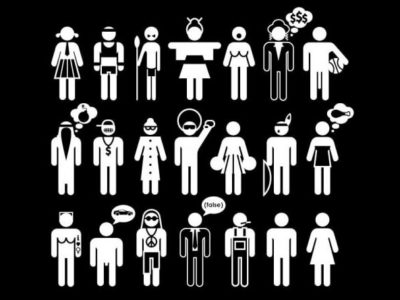“LAAA-CET—is that how you pronounce it?” said a customer, reading my name off my Home Depot apron. “No, it’s pronounced LIH-ZEHT,” I corrected the customer. He then asked the million-dollar question, “Ahhhhh. Your name sounds so interesting and beautiful. Where are you from?” Of course I knew what he meant. As he looked over my bronze skin, dark eyes, high cheekbones and curly hair and took into consideration my name, he came up with all of my possible exotic origins. I didn’t care what he meant. “I’m from California. Born and raised in Torrance.” He chuckles then reiterates his question. “No, I mean, where are you from?” Apparently, a tan girl with curly hair, dark eyes and high cheek bones can’t be a Torrance, CA, native.
For the past several years, I have attempted to separate myself from my ethnicity and race, yet people constantly remind me, in their eyes, I’m different. The situation I describe doesn’t end with me. Our world loves sizing us up and placing us in boxes because stereotypes live in the back of our minds. We have a list of unchecked boxes, much like the standardized tests we grew up taking, that makes us check off our ethnicity and race. We spend so much time differentiating each other that we look past what we have in common.
I’m not any different. I stereotype too. My Human Resources Management for Nonprofits professor brought in guests from the office of Multicultural & Diversity Affairs at the University of Florida. I expected a lecture full of charts indicating whites still seek a higher education more often than minorities, statistics on racism and harassment on campus, and how white cops keep shooting black men. I guessed completely wrong.
Our guests posted large sheets on the classroom’s walls, each with a different ethnicity or religion. “Get up and write on that poster whatever comes to mind. Don’t think. Write.” Startled by their instruction, I got up and shakily placed my pencil on each sheet. Dozens of stereotypes swarmed my mind, but writing them down felt impossible. Feeling embarrassed, I shied away from certain sheets or sloppily wrote on others. I didn’t want anyone seeing my thoughts. But the scene evolved into a nightmare. People read aloud each of the words written on the sheets. Redneck, racist, terrorist, abnormal, immigrant. They rang loudly in my ears and echoed in my mind. These are our thoughts about each other.
Racists, homophobes and terrorists don’t sit in my classroom. Society’s opinions and standards condition our way of thinking about others who don’t share the same skin color, hair, religion or language.
Then the guests handed us each a self-identification sheet. I panicked at the thought of categorizing myself; I just heard how others label me. I felt like shouting, “Let me be free! Let me be Lizzette.” Despite my instinct to flee class asap, I followed their instructions and filled out my race, ethnicity, country of origin, social class, age, gender and sexual orientation. On the flip side of the sheet, I listed three adjectives that describe me, my favorite food, music, color, hobby and movie.
Once we filled everything out, one of the guests asked us which social identity we think about most. I didn’t feel like sharing, so I avoided eye contact, but of course his finger landed on me. “You. What do you think about the most?” In that moment I realized, that although I avoid categorizing myself, society does it for me, and I’m aware of it. I easily labeled myself.
So what happens when we stop checking boxes on our lists for ourselves and others? Is it possible that we’ll have fewer cops shooting innocent people because the cop will no longer believe the stereotype? Or perhaps, we’ll become friends with those over our borders instead of fearing they’ll sabotage our land and steal our jobs. The millennial generation swarms college campuses nationwide, and we’re larger than the baby boomers. With the power of technology at our fingertips, we can create friendships with others halfway around the world. We’re the most educated generation, surrounded in school with people of all races and nationalities. We possess the power to build a future that Dr. King dreamed if you just put down your list and pencil.



















